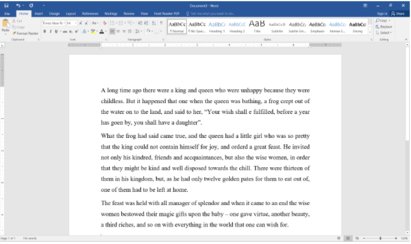Read the following passage and mark the letter A, B, C, or D on your answer sheet to indicate the correct answer to each of the questions from 31 to 38. Let children learn to judge their own work. A child learning to talk does not learn by being corrected all the time. If corrected too much, he will stop talking. He notices a thousand times a day the difference between the language he uses and the language those around him use. Bit by bit, he makes the necessary changes to make his language...
Đọc tiếp
Read the following passage and mark the letter A, B, C, or D on your answer sheet to indicate the correct answer to each of the questions from 31 to 38.
Let children learn to judge their own work. A child learning to talk does not learn by being corrected all the time. If corrected too much, he will stop talking. He notices a thousand times a day the difference between the language he uses and the language those around him use. Bit by bit, he makes the necessary changes to make his language like other people’s. In the same way, children learn all the other things they learn to do without being taught – to talk, run, climb, whistle, ride a bicycle – compare their own performances with those of more skilled people, and slowly make the needed changes. But in school we
never give a child a chance to find out his mistakes for himself, let alone correct them. We do it all for him. We act as if we thought that he would never notice a mistake unless it was pointed out to him, or correct it unless he was made to. Soon he becomes dependent on the teacher. Let him do it himself. Let him work out, with the help of other children if he wants it, what this word says, what the answer is to that problem, whether this is a good way of saying or doing this or not.
If it is a matter of right answers, as it may be in mathematics or science, give him the answer book. Let him correct his own papers. Why should we teachers waste time on such routine work? Our job should be to help the child when he tells us that he can’t find the way to get the right answer. Let’s end all this nonsense of grades, exams, and marks. Let us throw them all out, and let the children learn what all educated persons must someday learn, how to measure their own understanding, how to know what they know or do not know.
Let them get on with this job in the way that seems most sensible to them, with our help as school teachers if they ask for it. The idea that there is a body of knowledge to be learnt at school and used for the rest of one’s life is nonsense in a world as complicated and rapidly changing as ours. Anxious parents and teachers say, “But suppose they fail to learn something essential, something they will need to get on in the world?” Don’t worry! If it is essential, they will go out into the world and learn it.
Exams, grades and marks should be abolished because children’s progress should only be estimated by __________.
A. parents
B. educated persons
C. the children themselves
D. teachers




Đáp án A
Kiến thức: Viết lại câu
Giải thích:
Tạm dịch: Không công bằng khi đặt tất cả trách nhiệm cho anh ta. Anh ta không phải là người duy nhất có lỗi.
A. Anh ta không đáng bị đổ lỗi cho tất cả mọi thứ vì có những người khác có liên quan.
B. Anh ta xứng đáng bị trừng phạt, nhưng những người khác thì không.
C. Không đúng khi trừng phạt những người không có liên quan, như anh ta,.
D. Chỉ có người có liên quan mới phải bị trừng phạt.
Đáp án:A